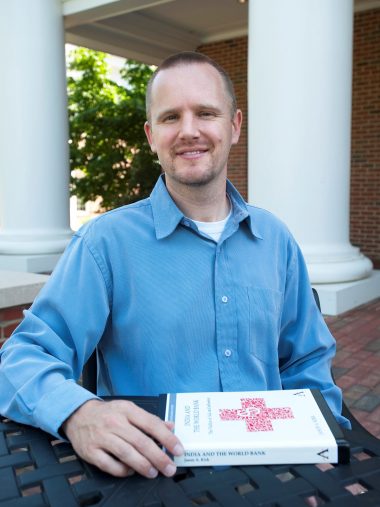India is the largest borrower from the World Bank, which has often helped the nation’s economy in recent years. Its assistance, however, may be about to change dramatically. India and the World Bank: The Politics of Aid and Influence, a new Anthem Press book by Jason Kirk, explores that partnership and suggests ways for the bank to adapt to new economic realities in the 21st century.

“People are beginning to realize that India certainly is a different kind of developing country,” said Kirk, an assistant professor of political science and international studies. “It doesn’t get pushed around. Nobody dictates terms to India. India dictates terms to the World Bank, not the other way around.”
For a democracy, India had been one of the most closed, centrally planned economies in the world dating from its independence in 1947. “It was essentially socialist,” Kirk said. Even the private sector was heavily regulated, a caution that stemmed from a legacy of colonialism and the suspicion of private profit motive.
In the 1980s, India found itself lagging behind its East Asian neighbors – most notably China – in economic development, and leaders recognized that the central planning model relied upon for decades was falling apart. During a severe economic crisis in 1990-91, the World Bank and the International Monetary Fund offered assistance, providing stabilization funds and low-interest loans to aid in development.
For several years, the World Bank provided aid to the central government, but in the mid 1990s, its policies shifted to allow for loans to Indian states. The new book looks at two questions: Why did the bank want to do it? And why did the Indian central government want the bank to do it?
“The Indian central government wanted the World Bank to do this because they felt there were economic reforms at the state level that needed to play out,” Kirk said. “It has really been India, and Indian leaders, who have been in the driver’s seat – not the World Bank – since the nation’s economic reforms two decades ago.”
The problem now, Kirk concludes in his book, is that India has reached a point where it soon will no longer qualify for “concessionary” low-interest loans from the World Bank. As a whole, the nation has improved its economic health, but individual states remain in dire situations while others thrive, creating an imbalance in a nation of more than 1 billion residents.
He suggests changes to bank policies that would allow low-interest loans for impoverished geographic regions within nations that, on the macro level, don’t qualify for such assistance. “What I’m really trying to do is reconceptualize the relationship between the World Bank and India in a way that brings the Indian state into view,” he said.
The World Bank has noticed his scholarship. In April, Kirk was invited by the World Bank’s India Club to speak about the book in a presentation moderated by the World Bank’s country director for India. The presentation came on the eve of the annual spring meetings of the World Bank and IMF in Washington, D.C.
Kirk earned his bachelor’s degree in journalism & mass communication and international studies at UNC Chapel Hill in 1997. Two years later he enrolled at the University of Pennsylvania to begin work on a doctorate with major fields in comparative politics and international relations.
Why Penn? Simple, Kirk said. The university boasts the oldest South Asian Studies program in the United States.
While there, Kirk worked as a research specialist in the Center for the Advanced Study of India. He joined the faculty at the Virginia Military Institute in 2006 as an assistant professor of international studies & political science. In 2008, he accepted an offer from the Department of Political Science and Public Administration at Elon.
“Jason’s scholarly expertise on India and the World Bank addresses an important area of study in international relations,” said political science professor Laura Roselle, who served as Elon’s Distinguished Scholar for 2009-2010. “Our students benefit from his knowledge, which is based on extensive field work in India and his deep understanding of international relations theory and practice.”


